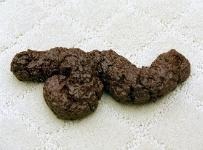
"What are you talking about?" you may ask. "Fake poop has been around for years. Why, I still giggle when I remember leaving a lump of plastic crap in the nave of the church my cousin Caroline was getting married in. The pastor spotted it right before the I-do's and had a mild heart attack right on the spot. He had to finish the ceremony strapped to an oxygen tank. Caroline hasn't spoken to me since. Best dollar-ninety-eight I ever spent."
No, not that kind of fake poop. This is fake poop with serious medical uses. Once again, it has to do with fecal transplant technology, which admittedly this column follows with scatological intensity. A fecal transplant, which consists of the patient consuming the feces of a healthy individual, restores the patient's intestinal function by replacing bacteria that the patient lacks in his own colon. Patients have been brought back from near-death by diarrhea by the technique.
The fact that this works brilliantly threatens the entire gastroenterological medical field. Extremely expensive drugs and complicated medical procedures were used to treat these patients prior to the discovery of the fecal transplant, but the patients sickened and sometimes died anyway. Now, after a quick snort of liquefied crap, they are up eating chili dogs and engaging in farting contests in no time.
American medical scientists quickly located the critical problem with fecal transplants—they couldn't make much money from them. Patients could be injected with crap in a simple office procedure and the therapeutic substance was free and abundant. From a certain point of view, the existence of the entire animal kingdom can be seen as a united effort to cover the earth with poop, from great whales gushing waste into the tranquil seas to a fruit fly speckling that apple you plan to have after lunch. Sources of human waste suitable for transplanting are equally plentiful, from your brother-in-law to your attorney to giant bloviating factories of poop like Rush Limbaugh or Kanye West. The cure for all intestinal disorders could be had on the cheap.
To the rescue come the researchers at Guelph University (coincidentally, "guelph" is the exact noise your throat wants to make if you think about their work very hard). They have cultured fake poop in an artificial colon. Their poop, they say, smells and tastes better than real poop. Not that they claim it smells and tastes good—minty fresh poop is still in the distant future, apparently. And manufacturing a substance that smells and tastes better than feces is not that much of an accomplishment anyway.
But the main thing is they can charge you for it. These artificial logs come with a serious price tag. Thus is the natural balance of American medicine restored—you give all your money to doctors, pharmacists and insurance companies and you get better, sometimes. You can't just indulge in freelance crap consumption and get well on the cheap. What are we, a bunch of German Shepherds?
I don't mean to make fun of these people that are seriously ill. I wish them well. When their dysenteric bowels are finally cured and they sit without worry on the toilets of America and produce their own flawless fecal specimens again, no one will be happier than I.
I just want to warn them—when that happens, there may be a co-pay.












 RSS Feed
RSS Feed











